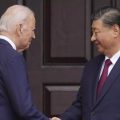Opec+ members have agreed to delay planned increases to oil production for at least two months as the group continues its battle to prop up prices that have fallen to their lowest levels this year.
Eight members of the producer group, including Saudi Arabia, Russia and the United Arab Emirates, were due to begin unwinding voluntary output cuts from the start of October but the curbs will now remain in place until December 1, they said in a joint statement after a virtual meeting on Thursday.
The planned increases would have lifted the group’s production by 180,000 barrels a day in October and by 540,000 b/d by the end of the year, as part of plans for a gradual unwinding of 2.2mn of voluntary cuts over the next 12 months.
“Opec+ have always stated they will adjust their policy depending on market conditions and that is exactly what they did as demand indications recently have been weak,” said Amrita Sen, director of research at Energy Aspects, a consultancy.
Opec+ members announced the plan to bring back output after its last meeting in June, even as it agreed to extend other production cuts to the end of 2025.
The group, led by Saudi Arabia and Russia, has repeatedly curbed oil output in recent years in an attempt to prop up prices.
Three different sets of cuts mean Opec+ members are currently producing almost 6mn b/d less than their combined capacity, representing about 6 per cent of global supply.
Saudi energy minister Prince Abdulaziz bin Salman in June said the plan to finally roll back some of the curbs could be halted at any time if market conditions soured.
On Wednesday Brent crude closed at $72.70 a barrel, the lowest since May 2023, as soft demand in China and the possible resolution of a dispute in Libya that has halted oil exports further weighed on prices. On Thursday it was up 0.1 per cent at $72.74.
Helima Croft, head of commodities research at RBC Capital Markets, said the production increases could easily be delayed again in December. “It’s another ‘to be determined’” she said. “It gives them breathing room.”
In the statement, Opec+ said it retained “the flexibility to pause or reverse” the planned production increases “as necessary”. It added that Iraq and Kazakhstan had failed to adhere to all of the cuts, pumping more oil than agreed since January 2024. Both countries reaffirmed their commitment to now produce less than their agreed quotas to compensate, it said.
The group’s next in-person meeting is scheduled for December 1 in Vienna, which will allow the members to meet and then communicate any decision in person.
“I think the communication mechanism of the public press conference remains important for market sentiment,” Croft said. “Written statements can become a kind of Rorschach test where everyone sees what they want to see in the ink blots of the communique.”



